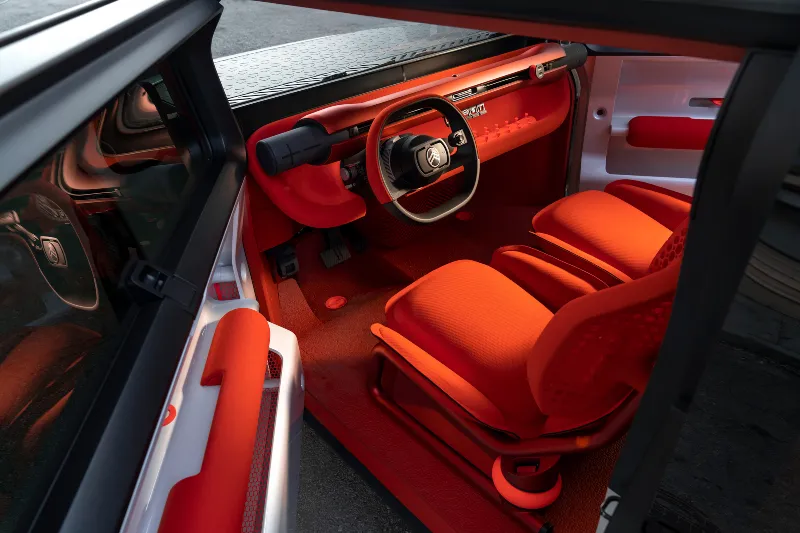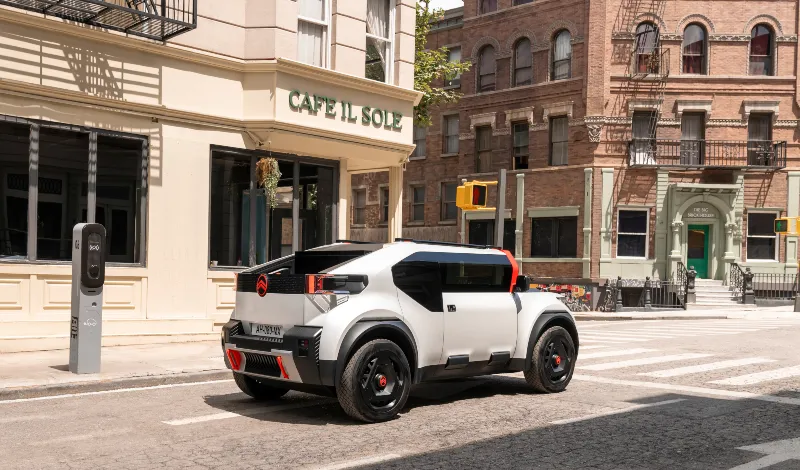This Citroen concept EV is made of reusable cardboard
The Citroen Oli concept has been described as a “multi-purpose electric device" capable of V2G and V2L power supply.
Concept electric vehicles (EVs) are a common occurrence in the world of automobiles, with the industry transitioning towards cleaner energy sources. Recently, we have come across numerous EV concepts from various auto brands which are expected to be the foundation stones for future mobility.
The latest EV concept comes from the house of French carmaker Citroen which unveiled a prototype named Oli (pronounced all-e). The Oli is an antecedent to all its future production models running on a battery power source in terms of design and technology.
Citroen describes Oli as a "working platform", and goes as far as to call it a “multi-purpose electric device" rather than just an electric car. Derived from the Ami electric city hatchback, the Oli concept focuses on reducing weight and complexity in EVs. At the same time, it makes for an affordable car achieved by using recycled and recyclable materials.

Citroen Oli concept EV
Exterior design
Based on Ami, the Oli concept borrows some quirky styling elements with the electric hatch. The most prominent highlight is its unconventional silhouette which focuses on efficiency, functionality, and durability. The central theme of the exterior design is highlighting the contrast between horizontal and vertical lines against the flat and curved surfaces.
The carmaker has utilised lightweight recycled honeycomb cardboard to design the flat bonnet, roof and rear pick-up bed. A vertical windscreen and an upright front and rear fascia create a contrasting effect with the horizontal surfaces. Headlamps and taillamps are flanked by two horizontal lines on the top and bottom.
The concept car rolls on unique steel/aluminium hybrid wheels shod with Goodyear Eagle GO concept tyres. In terms of dimensions, the vehicle measures 4,200mm in length, 1,650mm in height, and has a width of 1,900mm. Another interesting highlight is suicide-style doors with narrower rear doors than the front ones.
While the upright vertical surfaces do take away the car’s aerodynamic qualities, they require less real estate, thus saving on the cost and weight of the vehicle– the primary priority for Citroen. The Oli concept also flaunts Citroen’s new chevron logo featuring orange highlights.

Citroen Oli luggage bed at the rear
Interior design
Citroen has opted for a simple and minimalistic layout for its interiors, completely draped in an orange-coloured attire. The dashboard– featuring a single symmetrical beam– is devoid of any multimedia screen or driver’s display. It houses a smartphone dock and five toggle switches for climate control at the centre and the steering column and wheel on one side.
Each end of the hollow central beam can be docked with a Bluetooth speaker to create one’s in-car stereo system. The dashboard is supported by a shelf made of recycled 3D-printed thermoplastic featuring flexible "mushrooms" that keep knick-knacks in place.

Citroen Oli interiors
The front seats are made from strong tubular frames while the cushioning base is made from 100% recycled polyester. The seats’ design is unique too, particularly the 3D printed mesh pattern on the backrests. The rear seats fold completely flat while the individual head restraints fold out into the roof, making more cargo space for the loading bed at the rear.
Technical details
Powering Oli will be a humble 40kWh battery pack– good enough to offer a claimed range of 400 km on a single charge. Using a fast charger, the battery could be charged from 20% to 80% within 23 minutes. Citroen, however, hasn’t revealed any specs for the electric motor that will contribute to its performance.

Citroen Oli comes equipped with a 40kWh battery pack
Tata Tiago EV launched at Rs 8.45 lakh, most affordable electric car in India
The car’s top speed will be capped at 110 kmph to maximise efficiency. The concept car also supports vehicle-to-grid (V2G) and vehicle-to-load (V2L) capabilities, which means it can be used as a backup power source in the event of power loss. It comes with a 3.6kW power socket that can supply power to a 3kW electric device for around 12 hours.
Edited by Suman Singh







